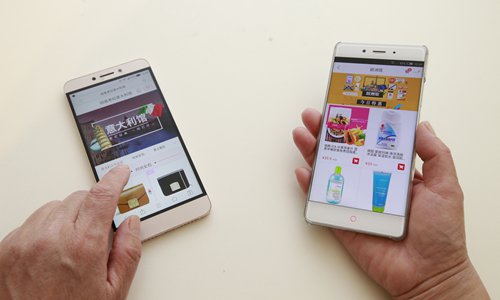
E-commerce platforms have become the easiest way for European companies to reach the Chinese market. (Photo: Li Hao/GT)
European brands eager to enter Chinese market struggle with policies, competition from knockoffs
○ Lured by the size of China's market and its growing middle class, European companies are trying to sell their products on Chinese e-commerce platforms
○ How to promote their brand, guarantee good quality as well as navigate changing government policies have posed obstacles to European firms entering China
Sitting beside dozens of other representatives of European companies in a Frankfurt meeting hall, Itzel Arriaga listened attentively to every speaker so she didn't miss out on anything related to doing business in China.
As the general manager of Moronni International, a company with both European and Chinese branches that mainly sells cosmetics and fragrances, Arriaga traveled several hours to Frankfurt from the company's Dutch headquarters to participate in the meeting hosted by Netease Kaola, one of China's leading e-commerce companies.
"I'm interested in entering the Chinese market, which is huge," she told the Global Times.
Arriaga is contemplating collaboration with China's e-commerce platforms to promote Moronni, which has an office in Southwest China's Chongqing Municipality, to Chinese customers.
"Products that are recognized in our country may not get recognition in China. I want to know how the platform can do promotion for us," Arriaga said.
Like Arriaga, every one of the more than 60 European companies participating in that day's event showed great interest in selling products in China. Compared with the sluggish European economy, China's rising middle class and demand for consumer goods are a tempting prospect.
Four companies signed contracts with Kaola that day but most are still on the fence. Despite the large market potential they see, brand promotion, changing government policies as well as quality control all pose obstacles in their way.
Catching up
Compared with Japanese and South Korean companies, European ones have been slower in cracking the Chinese market.
Over the past five years, as China's Internet sector has bloomed, companies from the US and South Korea have taken the initiative to cooperate with e-commerce firms to export their goods.
Japan joined this trend after seeing Chinese tourists flood into the country to go on shopping sprees. In comparison, European companies are more reserved. They are cautious about trying new things and prefer to stay in their comfort zone, said Zhang Lei, CEO of Netease Kaola.
But China's huge market has an irresistible appeal. Seeing the huge profits made by other countries' firms, they have started to overcome their conservatism.
According to Kaola, this year some European companies took the initiative to propose cooperation with the platform, for the first time.
Li Jing, a Chinese agent of Ricosta, a German children's shoe brand, told the Global Times that they have noticed that Chinese customers are demanding better goods and are increasingly willing to spend more cash on things they hope will boost their quality of life.
Sonja Müller, director of the China Competence Center and the East Asia, Frankfurt am Main Chamber of Commerce, said that most goods exported from Europe to China used to be for industrial use but an increasing proportion is now for individual use.
In March, German supermarket chain Aldi officially landed on Chinese e-commerce platform Tmall. Wal-Mart is also cooperating with e-commerce giant JD.com to bring British supermarket brand Asda to the Chinese market.
In the recent partnership meeting, Kaola announced that it will purchase no less than 3 billion euro ($3.3 billion) of goods from Europe.
"Our target customers are China's middle class, who number over 100 million. They are leading the consumption upgrade. Also, their lifestyle is closely linked to the Internet," said Zhang.
She added that many people now only use their platform to buy European milk powder but that she hopes this will change as people start to buy a wider range of goods.
A commentary published on news portal sohu.com pointed out that the Chinese middle class' shopping preferences are now driven primarily by quality.
They have long dropped the mentality of the planned economy period when commodities were scarce. But their demand for quality has not yet been met as the domestic market is filled with cheap, low-quality products. So they have to spend more money on imported foreign products to get the lifestyle they want, said the article.
So far German products are the bestsellers on China's e-commerce websites among European countries, followed by French goods.
"Under the potential threat of global trade protectionism, it's important for Germany to strengthen its trade relationship with China," said Yao Ling, deputy director with the Chinese Academy of International Trade and Economic Cooperation.
A spokesman from the Ministry of Commerce also stressed that China is not pursuing a surplus in its commodity trade with Europe.
But it's not only e-business giants making money from European imports, under the "Belt and Road Initiative," the Chinese government in January launched its first freight train to London from Yiwu West Railway Station, East China's Zhejiang Province. The 12,000-kilometer journey takes about 18 days and crosses countries including Kazakhstan, Russia, Germany and France before arriving in the United Kingdom. The trains carry Chinese goods to Europe and bring back products such as milk powder, pork and cosmetics.


















































